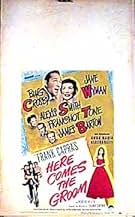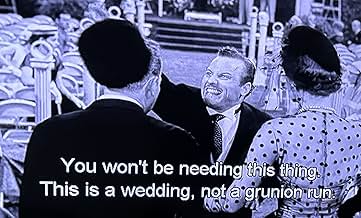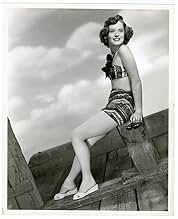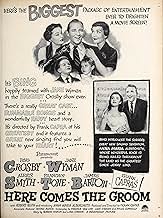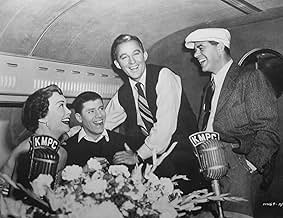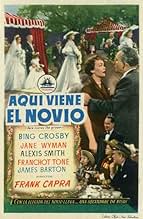IMDb RATING
6.3/10
1.3K
YOUR RATING
Foreign correspondent Pete Garvey has 5 days to win back his former fiancée, or he'll lose the orphans he adopted.Foreign correspondent Pete Garvey has 5 days to win back his former fiancée, or he'll lose the orphans he adopted.Foreign correspondent Pete Garvey has 5 days to win back his former fiancée, or he'll lose the orphans he adopted.
- Won 1 Oscar
- 3 wins & 5 nominations total
Jacques Gencel
- Bobby
- (as Jacky Gencel)
Featured reviews
A new and improved Jane Wyman appears in this picture with Bing Crosby. She is no longer the violated waif we saw in Johnny Belinda, but a self-confident woman who knows how to sing and clown around. Check out the moment where she visits Mr. Crosby in the guest house and proceeds to fall flat on her face in that larger-than-life dress! And she's sweet in the scenes with the kids, too.
But in case we forget that she's also a serious dramatic actress, there are moments of toughness between her and costar Alexis Smith. The film is a treat for any Wyman fan who enjoys watching the actress prove her versatility time and again, not that she ever had to. We have known about her talent for quite some time now.
But in case we forget that she's also a serious dramatic actress, there are moments of toughness between her and costar Alexis Smith. The film is a treat for any Wyman fan who enjoys watching the actress prove her versatility time and again, not that she ever had to. We have known about her talent for quite some time now.
If Frank Capra had a message in this film, it might have been that the in America, the wealthy, though as personable as anyone, do not always "get the girl." But they, as everyone, get something, and there is happiness to be had.
Bing Crosby was Bing Crosby, an incredible talent who could light up a motion picture with his facial expressions; when he sings, wow.
This is not a movie for those uptight with notions of a "Patriarchy"; it was 1951, and the general relationship between men and women had changed somewhat between then and now. You do the film a disservice by trying to do that, so put yourself in their shoes for an hour, thirteen, and let yourself feel good.
Hollywood doesn't make reporters like Pete Garvey anymore.
Bing Crosby was Bing Crosby, an incredible talent who could light up a motion picture with his facial expressions; when he sings, wow.
This is not a movie for those uptight with notions of a "Patriarchy"; it was 1951, and the general relationship between men and women had changed somewhat between then and now. You do the film a disservice by trying to do that, so put yourself in their shoes for an hour, thirteen, and let yourself feel good.
Hollywood doesn't make reporters like Pete Garvey anymore.
6tavm
For the last several days, I had been watching a series of films made in the '40s that coincidentally had a player from my favorite movie It's a Wonderful Life in it. Well, now I'm commenting on one from that picture's director, Frank Capra, which happened to have several players from his movie. Among them were H.B. Warner, J. Farrell MacDonald, Charles Lane, and Charles Halton. IMDb also lists Ellen Corby, Carl "Alfalfa" Switzer, and Jimmy Hawkins but I didn't recognize them. The site also mentioned frequent Laurel & Hardy player James Finlayson in here but, once again, I didn't find him. Anyway, this was an uneven romantic musical comedy starring Bing Crosby and Jane Wyman that didn't become funny to me until Bing's character starting living in Jane's potential future husband's mansion. That possible husband was played by Franchot Tone whose straight presence brings a steady tone that makes some of the more silly or over-the-top moments more tolerable. Alexis Smith plays a cousin, fourth removed, of Tone's whose transformation to something closer to Ms. Wyman's actual demeanor is one of the more genuinely charming moments. I also liked a sequence in which Ms. Wyman appears in hologram form when Bing plays a record from her in which she basically declares her through with him especially the way the scene ended. A couple of people I didn't find funny were Jane's parents especially the drunk father. As for the songs, Hoagy Carmichael and Johnny Mercer's "In the Cool, Cool, Cool, of the Evening" with Crosby and Wyman is a great number that seems played with no cuts whatever and possibly in one take. I also loved that one-of several they wrote here-Ray Evans and Jay Livingston song "Misto Christofo Columbo" that features Bing with Dorothy Lamour, Phil Harris, Cass Daley, Frank Fontaine (in his Crazy Gugenheim character), and the one and only Satchmo-Louis Armstrong. What a gas that was! There's also a nice operatic number from a young girl named Anna Maria Alberghetti in the beginning. By the way, I first saw her several months ago when I watched her grown-up in Ten Thousand Bedrooms, Dean Martin's first solo picture. In summation, Frank Capra's Here Comes the Groom is no great shakes but it's still quite enjoyable fluff overall.
It's a lightweight comedy, but this film has unforgettable moments. Plotwise, it's postwar Capra claptrap complete with French orphans-- but also some dazzling camera work and a few did-I-just-see-that? Surrealistic touches.
The first is a hologram of sorts: Bing's in France listening to an audio letter from fiancée, Jane Wyman-- a Dear John recordio-gram. As it's playing, Wyman materializes on the spinning record, Princess Leia-like. So I should have been prepared for anything, but when Der Bingle is on the plane back to America, he (of course) starts singing to the orphans. The tune is "Misto Cristofo Columbo"-- and suddenly Louis Armstrong walks into the airline cabin, complete with trumpet and hankie-- then up pops the bottom of the Hollywood barrel: Dorothy Lamour, Frank Fontaine and Phil Harris, all singing.
When the plane, and the plot, land in Boston, Bing has to win Jane back from Franchot Tone, which he does via a Pygmalion subplot involving Alexis Smith and men's pajamas. Hubba hubba. Best of all though is one of film's great tracking shots (nothing compared to "I Am Cuba," but still), a song-and-dance number through an office building to "In the cool cool cool of the evening." If only they'd brought Satchmo back for the big double-wedding ending.
The first is a hologram of sorts: Bing's in France listening to an audio letter from fiancée, Jane Wyman-- a Dear John recordio-gram. As it's playing, Wyman materializes on the spinning record, Princess Leia-like. So I should have been prepared for anything, but when Der Bingle is on the plane back to America, he (of course) starts singing to the orphans. The tune is "Misto Cristofo Columbo"-- and suddenly Louis Armstrong walks into the airline cabin, complete with trumpet and hankie-- then up pops the bottom of the Hollywood barrel: Dorothy Lamour, Frank Fontaine and Phil Harris, all singing.
When the plane, and the plot, land in Boston, Bing has to win Jane back from Franchot Tone, which he does via a Pygmalion subplot involving Alexis Smith and men's pajamas. Hubba hubba. Best of all though is one of film's great tracking shots (nothing compared to "I Am Cuba," but still), a song-and-dance number through an office building to "In the cool cool cool of the evening." If only they'd brought Satchmo back for the big double-wedding ending.
Another Bing Crosby vehicle and another job for Frank Capra at Paramount, his last, Here Comes the Groom is a light and frilly affair that takes too long to do too little but is intermittently charming along the way. It's a largely unremarkable film that doesn't try to make a whole lot of sense, especially in its ending, but at least Crosby and Jane Wyman work well together.
Pete Garvey (Crosby) is a war correspondent still in Paris several years after the end of WWII, latching onto an orphanage of war orphans about whom he is writing a series of stories about in order to get them adopted and sending them back to his editor George (Robert Keith) who is getting tired of them since the world has moved on. He also has a girl back home, Emmadel (Wyman), who has grown sick of waiting for her beau to return and sends him a record of her voice telling him that she's leaving him. It's really the only fun bit of filmmaking in the whole thing since Capra has her superimposed on top of the record to speak the lines and even ends with a fun bit of nonsense around the mechanics of the player itself.
Well, Pete gets the bug to go back home, but not before he disappears for two months to find the birth certificates of his two favorite orphans Bobby (Jacques Gencel) and Suzi (Beverly Washburn). I think this is supposed to establish Pete as forgetful but dedicated, and yet the rest of the film is him laser focused on getting what he needs without wavering. It's almost like the script by Virginia Van Upp, Liem O'Brien, and Myles Connolly was kind of just slap-dashed together, or something.
Anyway, the only real reason to see this film is Crosby himself. He's a charming lead and much more in line with the tenor of the overall picture here than he had been in Riding High. Here, he's a lovable heel who needs to find a way to get back home, convince the woman he loves that she still loves him, and undermine her quickly scheduled marriage to Wilbur Stanley (Franchot Tone), the latest in the line of a wealthy and powerful Bostonian family. The competition that develops between Pete and Wilbur is friendly and leads to no real hard feelings on any front, even when Wilbur conspires to have the orphans adopted if and when Pete doesn't get married on time (a condition of the adoption since he's a bachelor). It's almost like none of the characters consider there to be anything like stakes around the place.
Well, the bulk of the film is Crosby charming his way back into Emmadel's heart (the first rendition of the Oscar winning song "In the Cool, Cool, Cool of the Evening" is a delightful narrative treat since it shows the two still having a connection that develops over the song), spruce up Wilbur's cousin (fourth-cousin once removed) Winifred (Alexis Smith) so that she can become attractive to Wilbur instead, all while George hangs around for little reason other than to give some funny quips now and then. The finale is the big, to do wedding with many important guests and some bit of farce to get Pete on the altar instead of Wilbur that everyone just accepts because the feelings of the orphans are important and this very real ceremony isn't real, or something. It makes just this side of no sense, made all the weirder by Wilbur's reaction to it all which is like he didn't care.
So, it's very slight. It has some real charm to it. It's loosely told and kind of nonsensical. It has a nice song that it overplays (I didn't need to hear "Evening" three times, but whatever, it's not like there's a whole lot else). It's primarily a vehicle to showcase Bing Crosby's charm, and it does that reasonably well.
I think it would have worked better at 90 minutes instead of 110, though.
Pete Garvey (Crosby) is a war correspondent still in Paris several years after the end of WWII, latching onto an orphanage of war orphans about whom he is writing a series of stories about in order to get them adopted and sending them back to his editor George (Robert Keith) who is getting tired of them since the world has moved on. He also has a girl back home, Emmadel (Wyman), who has grown sick of waiting for her beau to return and sends him a record of her voice telling him that she's leaving him. It's really the only fun bit of filmmaking in the whole thing since Capra has her superimposed on top of the record to speak the lines and even ends with a fun bit of nonsense around the mechanics of the player itself.
Well, Pete gets the bug to go back home, but not before he disappears for two months to find the birth certificates of his two favorite orphans Bobby (Jacques Gencel) and Suzi (Beverly Washburn). I think this is supposed to establish Pete as forgetful but dedicated, and yet the rest of the film is him laser focused on getting what he needs without wavering. It's almost like the script by Virginia Van Upp, Liem O'Brien, and Myles Connolly was kind of just slap-dashed together, or something.
Anyway, the only real reason to see this film is Crosby himself. He's a charming lead and much more in line with the tenor of the overall picture here than he had been in Riding High. Here, he's a lovable heel who needs to find a way to get back home, convince the woman he loves that she still loves him, and undermine her quickly scheduled marriage to Wilbur Stanley (Franchot Tone), the latest in the line of a wealthy and powerful Bostonian family. The competition that develops between Pete and Wilbur is friendly and leads to no real hard feelings on any front, even when Wilbur conspires to have the orphans adopted if and when Pete doesn't get married on time (a condition of the adoption since he's a bachelor). It's almost like none of the characters consider there to be anything like stakes around the place.
Well, the bulk of the film is Crosby charming his way back into Emmadel's heart (the first rendition of the Oscar winning song "In the Cool, Cool, Cool of the Evening" is a delightful narrative treat since it shows the two still having a connection that develops over the song), spruce up Wilbur's cousin (fourth-cousin once removed) Winifred (Alexis Smith) so that she can become attractive to Wilbur instead, all while George hangs around for little reason other than to give some funny quips now and then. The finale is the big, to do wedding with many important guests and some bit of farce to get Pete on the altar instead of Wilbur that everyone just accepts because the feelings of the orphans are important and this very real ceremony isn't real, or something. It makes just this side of no sense, made all the weirder by Wilbur's reaction to it all which is like he didn't care.
So, it's very slight. It has some real charm to it. It's loosely told and kind of nonsensical. It has a nice song that it overplays (I didn't need to hear "Evening" three times, but whatever, it's not like there's a whole lot else). It's primarily a vehicle to showcase Bing Crosby's charm, and it does that reasonably well.
I think it would have worked better at 90 minutes instead of 110, though.
Did you know
- Trivia"In the Cool, Cool, Cool of the Evening" was the fourth song performed by Bing Crosby in a film that went on to win the Academy Award for Best Song.
- GoofsWhen Winifred seeks shelter in Garvey's home, George is on the phone. In a close-up, the phone is to his ear, but in the next medium shot, the phone is hung up, and he picks up the receiver again.
- Quotes
Husband on Airplane: [Complaining about fellow passenger Bing Crosby's singing on plane] Oh... There they go again ! Don't these actors ever stop making noises?
Wife on Airplane: They're USO people. They sing for soldiers.
Husband on Airplane: Soldiers can shoot back. They've got guns.
- ConnectionsFeatured in Paramount Presents (1974)
- SoundtracksMisto Cristofo Columbo
Written by Ray Evans and Jay Livingston
Performed by Bing Crosby, Dorothy Lamour, Louis Armstrong, Cass Daley,
Phil Harris, Frank Fontaine
- How long is Here Comes the Groom?Powered by Alexa
Details
Box office
- Budget
- $2,117,000 (estimated)
- Runtime1 hour 53 minutes
- Color
- Aspect ratio
- 1.37 : 1
Contribute to this page
Suggest an edit or add missing content



